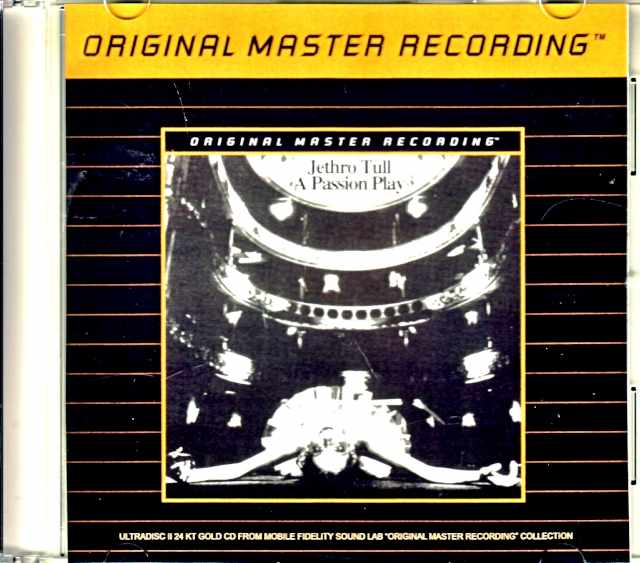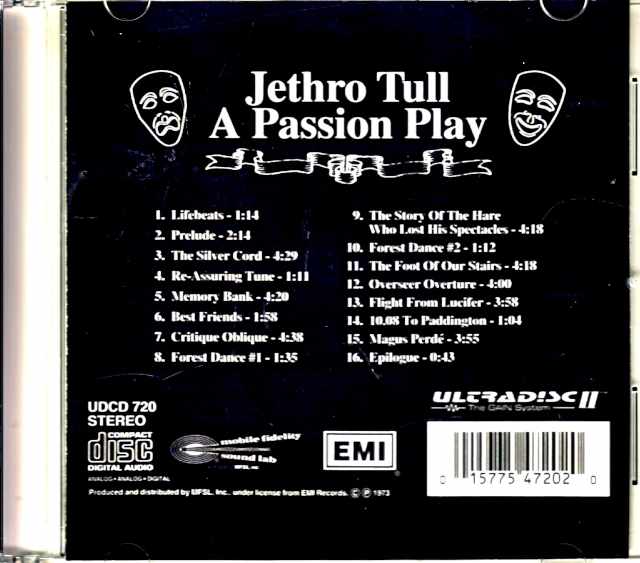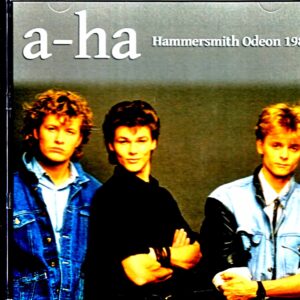Description
The latest release of the popular “Mobile Fidelity” CD reissue series has been confirmed. Mobile Fidelity Sound Lab (MFSL), a manufacturer specializing in analog masters, is a trusted brand that is highly supported by audiophiles around the world. With the utmost passion, sound masters have digitized many of the greatest albums from master tapes. Among the series, this work includes the CD “UDCD 720” released in 1998. It is JETHRO TULL’s ultimate progressive record “Passion Play”. Mobile Fidelity, which placed the utmost importance on master tape sound, was at the peak of its analog CD production in the 1990s, and many high-quality CDs appeared, but MFSL was in a class of its own. Other high-quality CDs are based on the idea of ”suppressing digital degradation” by using new technology to reduce the discomfort of compression or reduce reading errors in the material. In contrast, MFSL’s policy is to “faithfully reproduce the sound engraved on the master tape and not add anything extra.” They have developed their own “half-speed mastering” technology that focuses on the stage of extracting sound from magnetic tape, placing the utmost importance on “the analog recorded sound itself”. Since 1987, MFSL has borrowed original master tapes from record companies and meticulously digitized many masterpieces one by one. They released the “Ultradisc” series, which transfers the sound of the master tape to CD. Currently, they are also expanding into the fields of SACD and LP, but the point is that this work was made into a CD in the early 1990s. Magnetic tape masters are vulnerable to deterioration over time, and the more time passes, the more the sound at the time of recording is lost. There are cases where the tape is distorted or stuck, but even if it is stored carefully, it cannot prevent the loss of magnetism. Nowadays, it is becoming the case that LPs recorded with physical grooves sound better than the master tape itself. In that respect, the “Ultradisc” series was a great achievement. It started in the 1980s when CDs were in widespread use, and the sound of the master tape was digitally recorded before the arrival of the new technology CD, which boasted high sound quality. The original world of Passion Play, which precisely reproduces even the breathing of the band, is conveyed in this work, “Passion Play,” which conveys the master sound “25 years after recording.” Unlike the usual two-track specification, it is nice that the tracks are divided into small parts, but what is more important than that is the sound. The real and natural feeling of the band’s breathing is wonderful. What you feel at first listen is the “gaps” in the ensemble. The current remastered CD is equalized in a style that emphasizes all the instruments, perhaps as a result of sound pressure. Each sound of each instrument has a strong attack and a thick reverberation. “Everything” is emphasized as if to say to the listener, “This sound was included!” I understand the intention and effect, but it is too much when viewed as a musical work as a whole. In the part where the whole band plays the theme, everything is powerful and cluttered. It’s as if the sound is hitting you from all directions and you’re suffocating. However, this work is different. Rather than emphasizing each sound, it reproduces the recorded “raw sound” down to the finest details. Therefore, while the contours are sharp and steep, the peaks do not protrude, and the “gaps” are alive. If you want to visually compare this feeling, the artwork of “Passion Play” would be a good example. If the natural work is a dignified monochrome theater image as in the original, the current remastered CD is like a crowded train. It’s a “density / jostling” sound that makes you feel like even a fallen ballerina will be trampled. If the whole band is going to be full, is the current remastered CD better for the part where you play and sing with fewer sounds? Not necessarily. In such parts, the peaks of each emphasized sound pierce your ears like a spear, and it hurts sharply because the surrounding sounds are weak. Originally, it was a soft sound part that was meant to be expressed quietly and richly, but the mastering engineer’s insistence that “There’s even this kind of sound! Do you even notice it!” is what bothers me. I’ve ended up just badmouthing the current remastered CD, but on the other hand, this is the beauty of this work. It reproduces the sound and ensemble that the band wants to play, not the assertions of later engineers, honestly and precisely. You can immerse yourself in the “original world of passion play” that JETHRO TULL tried to portray with the master sound. The master sound of this great masterpiece has been preserved until the present day because it is a CD by “Mobile Fidelity”. Even if you want to get the actual thing now, it is difficult because it was originally produced in limited quantities. This release is to allow as many people as possible to experience this beautiful sound. Taken from the original US Mobile Fidelity Sound Lab CD(UDCD 720) Ultradisc II CD from Mobile Fidelity Sound Lab “Original Master Recording” Collection1. Lifebeats 2. Prelude 3. The Silver Cord 4. Re-Assuring Tune5. Memory Bank 6. Best Friends 7. Critique Oblique 8. Forest Dance #1 9. The Story Of The Hare Who Lost His Spectacles 10. Forest Dance #2 11. The Foot Foot Of Our Stairs 12. Overseer Overture 13. Flight From Lucifer 14. 10.08 To Paddington 15, Magus Perdé 16. Epilogue







Reviews
There are no reviews yet.